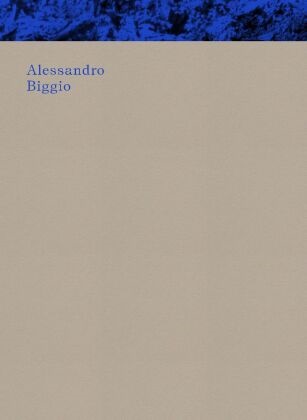Ulteriori informazioni
Insularität, Isolation und Distanz als Triebfedern künstlerischer Forschung
In seinen Arbeiten verwendet Alessandro Biggio (geb. 1974 in Cagliari, lebt und arbeitet in Cagliari und Calasetta, Italien) Materialien wie Asche und Ton, die er in ihrer Schichtung und Konzentration auf ihre Transformation zur Skulptur und Installation hin untersucht. Die Entfaltung des sich oft wiederholenden, bisweilen rituell anmutenden künstlerischen Prozesses wird zum Mittelpunkt der ästhetischen Reflexion in Biggios konzeptstarken Arbeiten. In kleinen Schritten aufgebaut, entstehen die Werke oft über lange Zeiträume hinweg. Die zeitliche Dimension erweist sich so als das eigentliche Material seiner Kunst, die mit Referenzen zur Arte Povera spielt.
Das Buch ergründet die für Biggio elementaren und philosophischen Fragen des Seins. Im kollaborativen Zusammenspiel zwischen seinen Arbeiten und den Fotografien von Michael Höpfner zeigt die Monografie das spannungsgeladene Werk des Künstlers und verortet dieses in seiner Heimat Sardinien - zwischen Calasetta und Cagliari verweist es auf die Bedeutung von Heimat. Mit Essays von Heike Eipeldauer, Lorenzo Giusti, David Komary, Marta Papini und Giacomo Spissu.
Insularity, Isolation, and Distance as Driving Forces of Artistic Research
In his works, Alessandro Biggio (b. Cagliari, 1974; lives and works in Cagliari and Calasetta, Italy) uses materials such as ash, clay, and canvas, which he transforms into explorations in the field of sculpture and installation. The unfolding of the often repetitive and at times seemingly ritualistic creative process becomes the central concern of aesthetic reflection in the artist's conceptually driven works. Constituted in minor steps, the work is often created over long periods of time. The temporal dimension thus proves to be the intrinsic material of his art, which has references to Arte Povera.
The book explores the philosophical questions of being, which are elementary for Biggio. In a collaborative interplay between his works and Michael Höpfner's photographs, the monograph shows the artist's vibrant oeuvre and locates it in his homeland Sardinia--between Calasetta and Cagliari, exploring the meaning of home. With essays by Heike Eipeldauer, Lorenzo Giusti, David Komary, Marta Papini, and Giacomo Spissu.
Riassunto
Insularität, Isolation und Distanz als Triebfedern künstlerischer Forschung
In seinen Arbeiten verwendet Alessandro Biggio (geb. 1974 in Cagliari, lebt und arbeitet in Cagliari und Calasetta, Italien) Materialien wie Asche und Ton, die er in ihrer Schichtung und Konzentration auf ihre Transformation zur Skulptur und Installation hin untersucht. Die Entfaltung des sich oft wiederholenden, bisweilen rituell anmutenden künstlerischen Prozesses wird zum Mittelpunkt der ästhetischen Reflexion in Biggios konzeptstarken Arbeiten. In kleinen Schritten aufgebaut, entstehen die Werke oft über lange Zeiträume hinweg. Die zeitliche Dimension erweist sich so als das eigentliche Material seiner Kunst, die mit Referenzen zur Arte Povera spielt.
Das Buch ergründet die für Biggio elementaren und philosophischen Fragen des Seins. Im kollaborativen Zusammenspiel zwischen seinen Arbeiten und den Fotografien von Michael Höpfner zeigt die Monografie das spannungsgeladene Werk des Künstlers und verortet dieses in seiner Heimat Sardinien – zwischen Calasetta und Cagliari verweist es auf die Bedeutung von Heimat. Mit Essays von Heike Eipeldauer, Lorenzo Giusti, David Komary, Marta Papini und Giacomo Spissu.
Insularity, Isolation, and Distance as Driving Forces of Artistic Research
In his works, Alessandro Biggio (b. Cagliari, 1974; lives and works in Cagliari and Calasetta, Italy) uses materials such as ash, clay, and canvas, which he transforms into explorations in the field of sculpture and installation. The unfolding of the often repetitive and at times seemingly ritualistic creative process becomes the central concern of aesthetic reflection in the artist’s conceptually driven works. Constituted in minor steps, the work is often created over long periods of time. The temporal dimension thus proves to be the intrinsic material of his art, which has references to Arte Povera.
The book explores the philosophical questions of being, which are elementary for Biggio. In a collaborative interplay between his works and Michael Höpfner’s photographs, the monograph shows the artist’s vibrant oeuvre and locates it in his homeland Sardinia––between Calasetta and Cagliari, exploring the meaning of home. With essays by Heike Eipeldauer, Lorenzo Giusti, David Komary, Marta Papini, and Giacomo Spissu.

